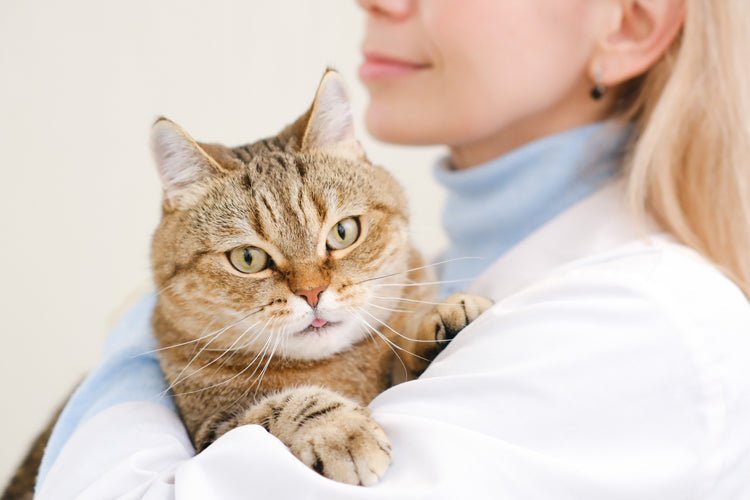How do Cats Get Urinary Tract Infections

Feline urinary tract infections (UTIs) are exactly what they sound like—painful bacterial invasions of the urinary tract that can cause frequent urination, bloody urine, or even complete blockage. They're not just uncomfortable; if left untreated, they can lead to serious complications like kidney infections or life-threatening urinary blockages. One often overlooked factor in preventing UTIs is maintaining a clean litter box. A hygienic environment reduces bacterial exposure and encourages regular urination. The Meowant Self-Cleaning Cat Litter Box helps by automatically removing waste, it minimizes bacterial growth and helps keep your cat's urinary system happy and healthy.
Part 1. How Do Cats Get Urinary Infections? (Primary Keyword Section)
- Bacterial Infections: The most common culprit? Bacteria. These nasty microbes often sneak into the urinary tract when hygiene slips. If a cat's litter box isn't cleaned regularly, bacteria can multiply and transfer to their urethra when they squat to urinate.
- Bladder Stones or Crystals: Bladder stones and crystals can also wreak havoc. These sharp little irritants damage the bladder lining, making it easier for bacteria to invade. And what makes stones more likely to form? Dehydration. Many cats don't drink enough water, especially if they eat dry food exclusively. Concentrated urine becomes a playground for crystals and bacteria alike.
- Dirty Litter Boxes: If a litter box is left unclean, cats may avoid using it, holding their urine for too long. This stagnation allows bacteria to grow and increases UTI risk. A self-cleaning litter box like Meowant SC01 ensures a consistently clean space, reducing bacterial exposure.
- Stress & Anxiety: Stress-related conditions like Feline Idiopathic Cystitis (FIC) can mimic UTI symptoms. Changes in routine, new pets, or a dirty litter box can trigger inflammation in the bladder.
- Underlying Health Issues: Conditions like diabetes or kidney disease can weaken a cat's immune system, making them more susceptible to UTIs. Regular vet check-ups are crucial for early detection.
Part 2. How to Treat Urinary Tract Infection in Cats
If your cat is showing signs of a UTI—straining to pee, frequent licking, or blood in the urine, immediate veterinary care is crucial. Here's what treatment typically involves:
- Diagnostic Tests: A vet will run a urinalysis, blood test, or even an ultrasound to check for bacteria, crystals, or blockages.
- Antibiotics: If bacteria are the culprit, a course of antibiotics (like Clavamox) will be prescribed.
- Special Diet: For cats with bladder crystals, prescription urinary food (like Hill's c/d or Royal Canin Urinary SO) helps dissolve stones and balance pH levels.
- Hydration Boost: Wet food and cat water fountains encourage drinking, diluting urine and flushing out bacteria.
- Pain Management: Anti-inflammatory meds or muscle relaxants may be given if your cat is in discomfort.
- Stress Relief: Since stress worsens UTIs, calming diffusers (like Feliway) or a quiet, clean space can aid recovery.
Part 3. Preventing UTIs in Cats: Clean Litter Boxes Matter
Prevention is always better than treatment. Here's how to minimize UTI risks:
Keep the Litter Box Spotless
- Scoop daily—bacteria thrive in waste.
- Deep clean weekly with mild soap (avoid harsh chemicals).
- Consider a self-cleaning box like the Meowant MW-SC01, which removes waste automatically, reducing bacterial exposure.
Hydration is Key
- Offer multiple water bowls around the house.
- Switch to wet food (it's moisture-rich).
Reduce Stress
- Stick to a routine—cats hate unpredictability.
- Provide vertical spaces and interactive toys for mental stimulation.
Regular Vet Visits
- Annual check-ups catch early signs of diabetes or kidney issues, which can contribute to UTIs.
Part 4. Why the Meowant Self-Cleaning Litter Box Helps Prevent UTIs
A dirty litter box is a major UTI trigger, but scooping multiple times a day isn't always realistic. That's where the Meowant Self-Cleaning Litter Box (MW-SC01) shines:
[[推荐商品1]]
✅ Automatic Cleaning: It scoops automatically after each use, meaning there's no chance for bacteria to linger or build up. That consistent cleanliness alone helps reduce the risk of UTIs, especially those caused by poor litter hygiene.
✅ Odor Control: Cats are sensitive to smell, and a stinky box can cause them to hold their urine or avoid the litter altogether. That behavior increases infection risk. But the MW-SC01 keeps the environment neutral, making it more inviting for your cat to do their business regularly.
✅ Encourages Regular Use: What I also love is how it helps with routine and stress reduction. No more unpredictable cleaning schedules. My cat always has a clean space, and that alone has improved her litter habits. More frequent urination means a healthier bladder.
If you want to protect your cat's urinary health, this isn't just a convenience—it's part of a smart, proactive care plan.
Conclusion
Feline UTIs are painful and potentially dangerous, but with a little diligence, they're often preventable. Keep an eye on your cat's litter habits, ensure they stay hydrated, and reduce environmental stress. And above all, don't overlook hygiene. The Meowant SC01 Self-Cleaning Litter Box takes the guesswork out of cleanliness, making it easier to support your cat's health every day.
